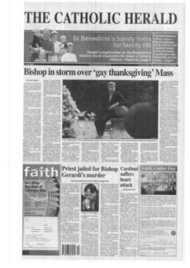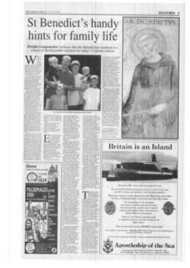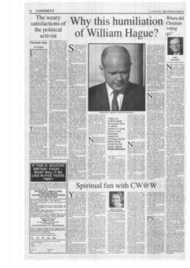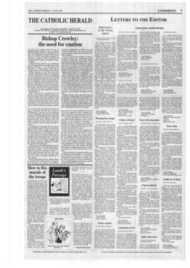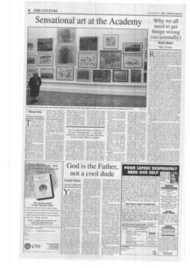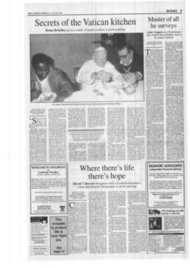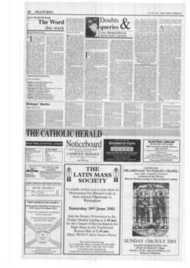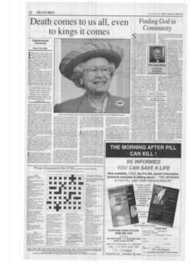Page 4, 15th June 2001
Page 4

Report an error
Noticed an error on this page?If you've noticed an error in this article please click here to report it.
Tags
Share
Related articles
Jubilee Revival For 'triumphalist' Children's March
Corpus Christi In Chelsea
Corpus Christi: A Time For Witness To The World
Corpus Christi Procession Revives London Tradition
June's Burst Of Weddings
Walking with God
The Corpus Christi procession enacts nothing less than the redemption of the world, says
Fr Jerome Bertram O25 June last year, shoppers and idlers in the King's Road, Chelsea, were startled; tourists and bargainhunters in Oxford's Commarket amazed; motorists and cyclists delayed, the police bemused, beggars confused, and the faithful triumphant as the Blessed Sacrament proceeded through the streets to celebrate Corpus Christi of the Holy Year of Jubilee.
The parish of St Mary's Cadogan Street brought Christ into the whirl of fashionable Chelsea; the entire Catholic Deanery of Oxford united to proclaim his presence in the squalid inner city. Nor were they alone: all over the world parishioners and their pastors Were taking to the streets, either on the Sunday afternoon or the previous Thursday, or both. The highlight of the Jubilee Year was that great irruption of the Church into the world as Christ walked among his people.
How did the citizens react? Some with fear, some no doubt with scorn, but many were touched. Both in Oxford and in Chelsea passers-by were seen to drop to their knees, strangers joined in the "Our Father" and trailed along behind the processions. Everyone loves a parade, and the spring sunshine showed up the banners and the crosses, "the white First Communion dresses and, the red rose petals, the glitter and the gold. Singing and music accompanied the processions, hymnbooks and rosaries were waved, loudspeakers enabled opposite ends of the procession to keep more or less in time. and in the midst of it all, serene, lifted up under the swaying canopy, rode the Monstrance, containing in itself all delight.
What does it mean, this public display of the Church's most intimate Sacrament? It means nothing less than the redemption of the world. Christ came not to condemn the world but to save it. (John 12:47) The essence of our faith is that God became one of us, to walk among us. In the Blessed Sacrament God walks, in a very literal way, among his people.
ACorpus Christi procession demonstrates two things: firstly that we believe that Our Lord is truly present under the form of bread, and secondly that he came to save all mankind, to call those outside the Church to happiness. Our faith is not something to be hidden behind closed doors, nor whispered in secret, but "proclaimed on the housetops". (Matth. 10:27)
Processions have always been a feature of our faith, and of the Old Testament before us. The Ark of the Covenant was specifically designed to be carried in triumphal procession through the desert, sent into battle, solemnly "trans lated" into the new Temple. The Psalms speak of joyful processions through the streets of Jerusalem. From the beginning Christians celebrated their faith with processions: the glad throng accompanying a new priest, or a new Pope; the solemn moving of relics from their obscure resting places to new shrines; the carrying of a statue to bless the streets, the crops. the fisheries. It is not surprising that soon after the Feast of Corpus Christi was instituted in the thirteenth century, the people spontaneously asked for the Blessed Sacrament as well to be carried in procession. Authors argue about which city has the honour of being the first to introduce the custom. but it is agreed that it was well established in England by 1318. It was always a popular initiative: Church councils in the fourteenth century observed this, and they approved. In England people set up Guilds of Corpus Christi, lay associations which organised more and more elate orate ceremonies, decorations, music, plays, dances, all to exult in the Blessed Sacrament.
In towns, people would hang their finest bedspreads out of their windows to deck the streets, and shower the passing procession with flower petals. The hierarchy observed this spontaneous expression of the people's faith, and was glad. Corpus Christi was the people's holiday because it was God's: the French still call it Fie-Dieu. "God's holiday".
Not, of course, that there were not enemies of Corpus Christi, the sour-faced who resented popular joy and popular piety. In the sixteenth century they raised the fatuous objection to these processions that they were an "innovation" and were unknown in the "early Church". The Council of Trent, ever progressive, replied that it was well aware that these processions were a new and exciting development in the history of Christendom, and welcomed them accordingly.
What the critics actually meant, of course, was that processions and merry-making kept the people from their work, and were bad for business.
Ignorance and superstition arose, when the sour-faced attacked the very basis of Christianity by denying that Christ had come among his people, ridiculing the Blessed Sacrament in language unfit for this family newspaper, encouraging the authorities to clamp down on this scandalous waste of time and resources. Corpus Christi processions were banned in this country in 1548.
The President and Fellows of Corpus Christi College Oxford were sent to prison for daring to celebrate their own feast day. When the brief gleam of freedom under Queen Mary was again extinguished in 1559 three thousand people took to the streets of Canterbury in a last defiant demonstration of love for Our Lord before the procession was again prohibited, and all display of Catholic belief driven into hiding. It was not until the end of the nineteenth century that Catholics once again dared to emerge from their burrows into the sunlit streets.
In the twentieth century it was the Nazis who set themselves against the traditional
processions, harassing, obstructing, diverting and eventually prohibiting those great Catholic displays. They resented the implication that the Catholic faith had something to say to the outside world; that religion might dare to burst out of the sanctuary into the streets.
They tried to restrict religion, to make it a hobby for adults only behind closed doors. Nor is the Nazi spirit quite dead: there are still those within the Catholic Church who find various pretexts for opposing the idea of Corpus Christi processions. Fr Benedict Groeschel, in his superb book In the Presence of Our Lord, shows how American liturgists and theorists have systematically attacked the whole idea of public displays of the Blessed Sacrament, Exposition, Benediction and processions alike, and how ultimately the underlying problem is that they have lost faith in the reality of Christ's presence in the world.
We have been fortunate in this country: Cardinal Hume, following the lead given by the present Holy Father, consistently promoted devotion to the Blessed Sacrament, and in his dying words called on us to renew our love and
affection for our Eucharistic Lord. And his successor has already demonstrated his devotion to the Corpus Christi Procession by taking an enthusiastic part, year after year, in the great floral processions at Arundel. It is not surprising that devotion to the Blessed Sacrament, expressed in days of Exposition, Holy Hours, Quarant'Ore, and the festivities of Corpus Christi, have become more and more widespread in our country.
I
4 t.i't it triumphal
1st?" I hear someon ask Maybe -but what's wrong with "triumphalism" anyway? It's a word bandied about to stop us enjoying ourselves. If the choice is between being "joyful and triumphant" or "dismal and despondent", I know which side the Gospels are on. "Triumph" is a very Scriptural concept: St Paul speaks movingly about how Christ has triumphed over sin and death, and how we are incorporated into his triumphal procession -and he even talks about the incense! "But thanks be to God who always gives us in Christ a part in his triumphal procession, and through us is spreading everywhere the fragrance of the knowledge of himself." (II Cor. 2:14, New Jerusalem Bible)
Corpus Christi is the second half of Maundy Thursday: on that day we do have a mournful procession, as we accompany Our Lord out of the Upper Room into the Garden of Gethsemane. Now that darkness is dispelled: Our Lord has faced death and has defeated it, and this is his victory parade. Our faith is meant to be enjoyable, and we are all invited to celebrate the triumph over gloom, despondency and sin. Corpus Christi gives us a chance to show the world that we do believe, that we do enjoy our faith, that we are not ashamed of having good news to share, and that God is not absent but really present in his Church.
This weekend is Corpus Christi — look out for a procession near you, perhaps on the Thursday afternoon (as at Arundel Cathedral at 5:30), or on the Sunday (as in Oxford, beginning at the Oratory at 2:30) Come prepared to sing, to be joyful, to celebrate, for Jesus Christ is moving among his people again in our time.
St Thomas Aquinas said in his great Corpus Christi hymn, quantum pores, tantum aude — dare to do as much as you can!
blog comments powered by Disqus


